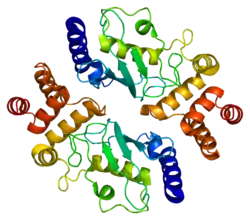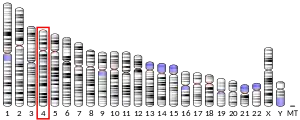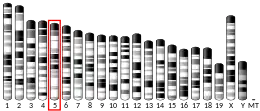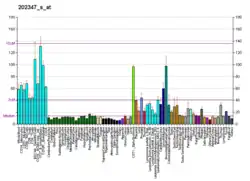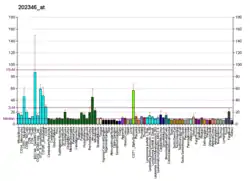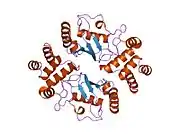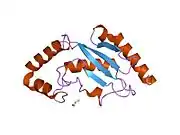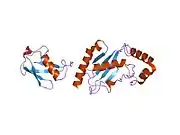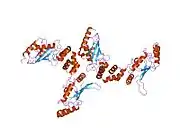Ubiquitin-conjugating enzyme E2 K is a protein that in humans is encoded by the UBE2K gene.[5][6][7]
The protein encoded by this gene belongs to the ubiquitin-conjugating enzyme family. It binds selectively to a large region at the N terminus of huntingtin. This interaction is not influenced by the length of the huntingtin polyglutamine tract. This protein has been implicated in the degradation of huntingtin and suppression of apoptosis.[7]
Interactions
HIP2 has been shown to interact with Huntingtin[5][8] and RNF2.[9]
References
- 1 2 3 GRCh38: Ensembl release 89: ENSG00000078140 - Ensembl, May 2017
- 1 2 3 GRCm38: Ensembl release 89: ENSMUSG00000029203 - Ensembl, May 2017
- ↑ "Human PubMed Reference:". National Center for Biotechnology Information, U.S. National Library of Medicine.
- ↑ "Mouse PubMed Reference:". National Center for Biotechnology Information, U.S. National Library of Medicine.
- 1 2 Kalchman MA, Graham RK, Xia G, Koide HB, Hodgson JG, Graham KC, Goldberg YP, Gietz RD, Pickart CM, Hayden MR (Sep 1996). "Huntingtin is ubiquitinated and interacts with a specific ubiquitin-conjugating enzyme". J Biol Chem. 271 (32): 19385–94. doi:10.1074/jbc.271.32.19385. PMID 8702625.
- ↑ Christensen DE, Brzovic PS, Klevit RE (Oct 2007). "E2-BRCA1 RING interactions dictate synthesis of mono- or specific polyubiquitin chain linkages". Nat Struct Mol Biol. 14 (10): 941–8. doi:10.1038/nsmb1295. PMID 17873885. S2CID 32160828.
- 1 2 "Entrez Gene: HIP2 huntingtin interacting protein 2".
- ↑ Faber PW, Barnes GT, Srinidhi J, Chen J, Gusella JF, MacDonald ME (Sep 1998). "Huntingtin interacts with a family of WW domain proteins". Hum. Mol. Genet. 7 (9): 1463–74. doi:10.1093/hmg/7.9.1463. PMID 9700202.
- ↑ Lee SJ, Choi JY, Sung YM, Park H, Rhim H, Kang S (Aug 2001). "E3 ligase activity of RING finger proteins that interact with Hip-2, a human ubiquitin-conjugating enzyme". FEBS Lett. 503 (1): 61–4. doi:10.1016/S0014-5793(01)02689-8. PMID 11513855. S2CID 42977319.
Further reading
- Petersén A, Mani K, Brundin P (1999). "Recent advances on the pathogenesis of Huntington's disease". Exp. Neurol. 157 (1): 1–18. doi:10.1006/exnr.1998.7006. PMID 10222105. S2CID 12974652.
- Coux O, Goldberg AL (1998). "Enzymes catalyzing ubiquitination and proteolytic processing of the p105 precursor of nuclear factor kappaB1". J. Biol. Chem. 273 (15): 8820–8. doi:10.1074/jbc.273.15.8820. PMID 9535861.
- Whitby FG, Xia G, Pickart CM, Hill CP (1999). "Crystal structure of the human ubiquitin-like protein NEDD8 and interactions with ubiquitin pathway enzymes". J. Biol. Chem. 273 (52): 34983–91. doi:10.1074/jbc.273.52.34983. PMID 9857030.
- Kikuchi J, Furukawa Y, Kubo N, Tokura A, Hayashi N, Nakamura M, Matsuda M, Sakurabayashi I (2000). "Induction of ubiquitin-conjugating enzyme by aggregated low density lipoprotein in human macrophages and its implications for atherosclerosis". Arterioscler. Thromb. Vasc. Biol. 20 (1): 128–34. doi:10.1161/01.ATV.20.1.128. PMID 10634809.
- Furukawa Y, Kubo N, Kikuchi J, Tokura A, Fujita N, Sakurabayashi I (2000). "Regulation of macrophage-specific gene expression by degenerated lipoproteins". Electrophoresis. 21 (2): 338–46. doi:10.1002/(SICI)1522-2683(20000101)21:2<338::AID-ELPS338>3.0.CO;2-9. PMID 10675012. S2CID 22857626.
- Lee SJ, Choi JY, Sung YM, Park H, Rhim H, Kang S (2001). "E3 ligase activity of RING finger proteins that interact with Hip-2, a human ubiquitin-conjugating enzyme". FEBS Lett. 503 (1): 61–4. doi:10.1016/S0014-5793(01)02689-8. PMID 11513855. S2CID 42977319.
- Gevaert K, Goethals M, Martens L, Van Damme J, Staes A, Thomas GR, Vandekerckhove J (2004). "Exploring proteomes and analyzing protein processing by mass spectrometric identification of sorted N-terminal peptides". Nat. Biotechnol. 21 (5): 566–9. doi:10.1038/nbt810. PMID 12665801. S2CID 23783563.
- Goehler H, Lalowski M, Stelzl U, Waelter S, Stroedicke M, Worm U, Droege A, Lindenberg KS, Knoblich M, Haenig C, Herbst M, Suopanki J, Scherzinger E, Abraham C, Bauer B, Hasenbank R, Fritzsche A, Ludewig AH, Büssow K, Buessow K, Coleman SH, Gutekunst CA, Landwehrmeyer BG, Lehrach H, Wanker EE (2004). "A protein interaction network links GIT1, an enhancer of huntingtin aggregation, to Huntington's disease". Mol. Cell. 15 (6): 853–65. doi:10.1016/j.molcel.2004.09.016. PMID 15383276.
- Kimura K, Wakamatsu A, Suzuki Y, Ota T, Nishikawa T, Yamashita R, Yamamoto J, Sekine M, Tsuritani K, Wakaguri H, Ishii S, Sugiyama T, Saito K, Isono Y, Irie R, Kushida N, Yoneyama T, Otsuka R, Kanda K, Yokoi T, Kondo H, Wagatsuma M, Murakawa K, Ishida S, Ishibashi T, Takahashi-Fujii A, Tanase T, Nagai K, Kikuchi H, Nakai K, Isogai T, Sugano S (2006). "Diversification of transcriptional modulation: large-scale identification and characterization of putative alternative promoters of human genes". Genome Res. 16 (1): 55–65. doi:10.1101/gr.4039406. PMC 1356129. PMID 16344560.
- Flierman D, Coleman CS, Pickart CM, Rapoport TA, Chau V (2006). "E2-25K mediates US11-triggered retro-translocation of MHC class I heavy chains in a permeabilized cell system". Proc. Natl. Acad. Sci. U.S.A. 103 (31): 11589–94. Bibcode:2006PNAS..10311589F. doi:10.1073/pnas.0605215103. PMC 1520313. PMID 16868077.
- de Pril R, Fischer DF, Roos RA, van Leeuwen FW (2007). "Ubiquitin-conjugating enzyme E2-25K increases aggregate formation and cell death in polyglutamine diseases". Mol. Cell. Neurosci. 34 (1): 10–9. doi:10.1016/j.mcn.2006.09.006. PMID 17092742. S2CID 9704303.
- Ewing RM, Chu P, Elisma F, Li H, Taylor P, Climie S, McBroom-Cerajewski L, Robinson MD, O'Connor L, Li M, Taylor R, Dharsee M, Ho Y, Heilbut A, Moore L, Zhang S, Ornatsky O, Bukhman YV, Ethier M, Sheng Y, Vasilescu J, Abu-Farha M, Lambert JP, Duewel HS, Stewart II, Kuehl B, Hogue K, Colwill K, Gladwish K, Muskat B, Kinach R, Adams SL, Moran MF, Morin GB, Topaloglou T, Figeys D (2007). "Large-scale mapping of human protein-protein interactions by mass spectrometry". Mol. Syst. Biol. 3 (1): 89. doi:10.1038/msb4100134. PMC 1847948. PMID 17353931.
This article is issued from Wikipedia. The text is licensed under Creative Commons - Attribution - Sharealike. Additional terms may apply for the media files.
